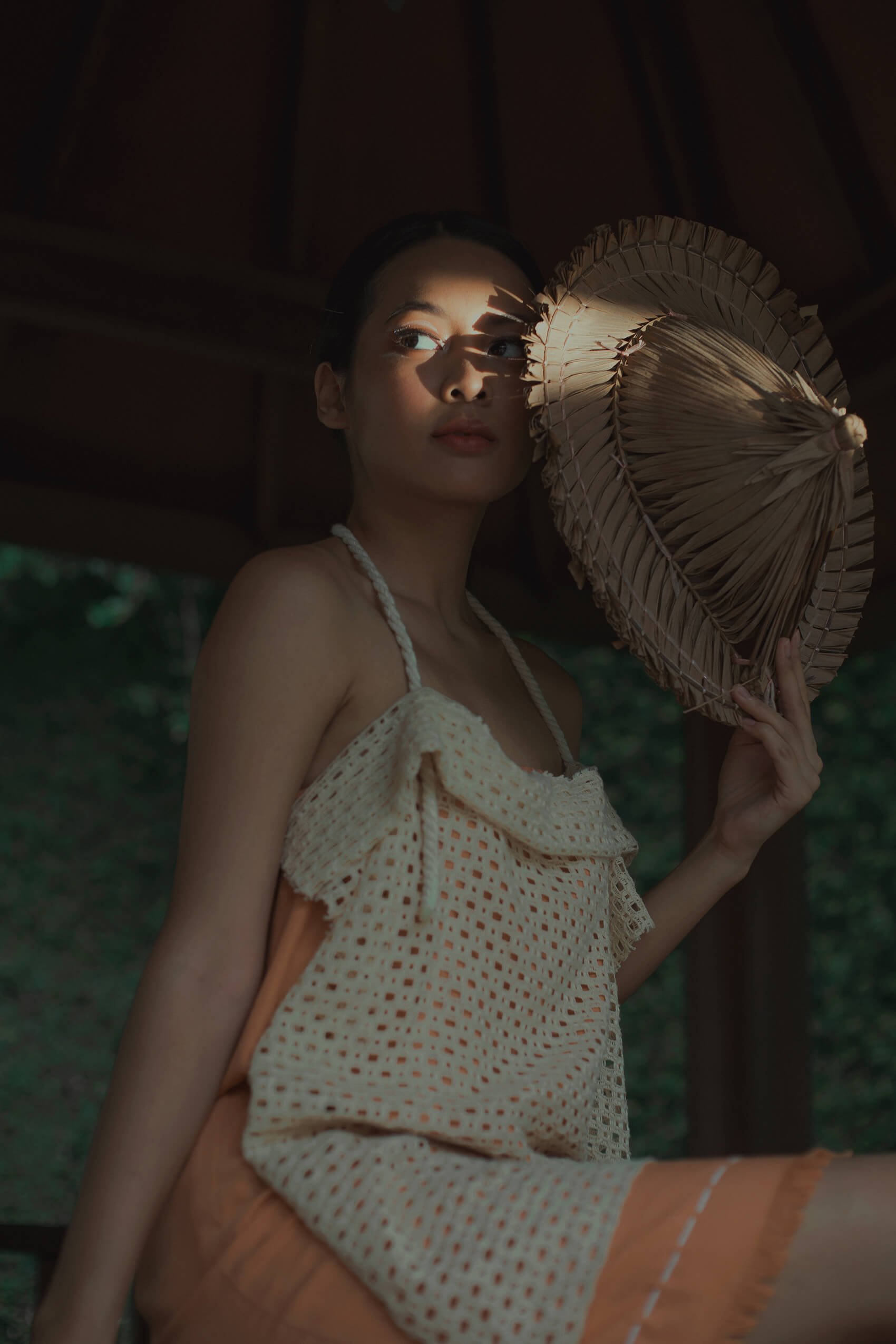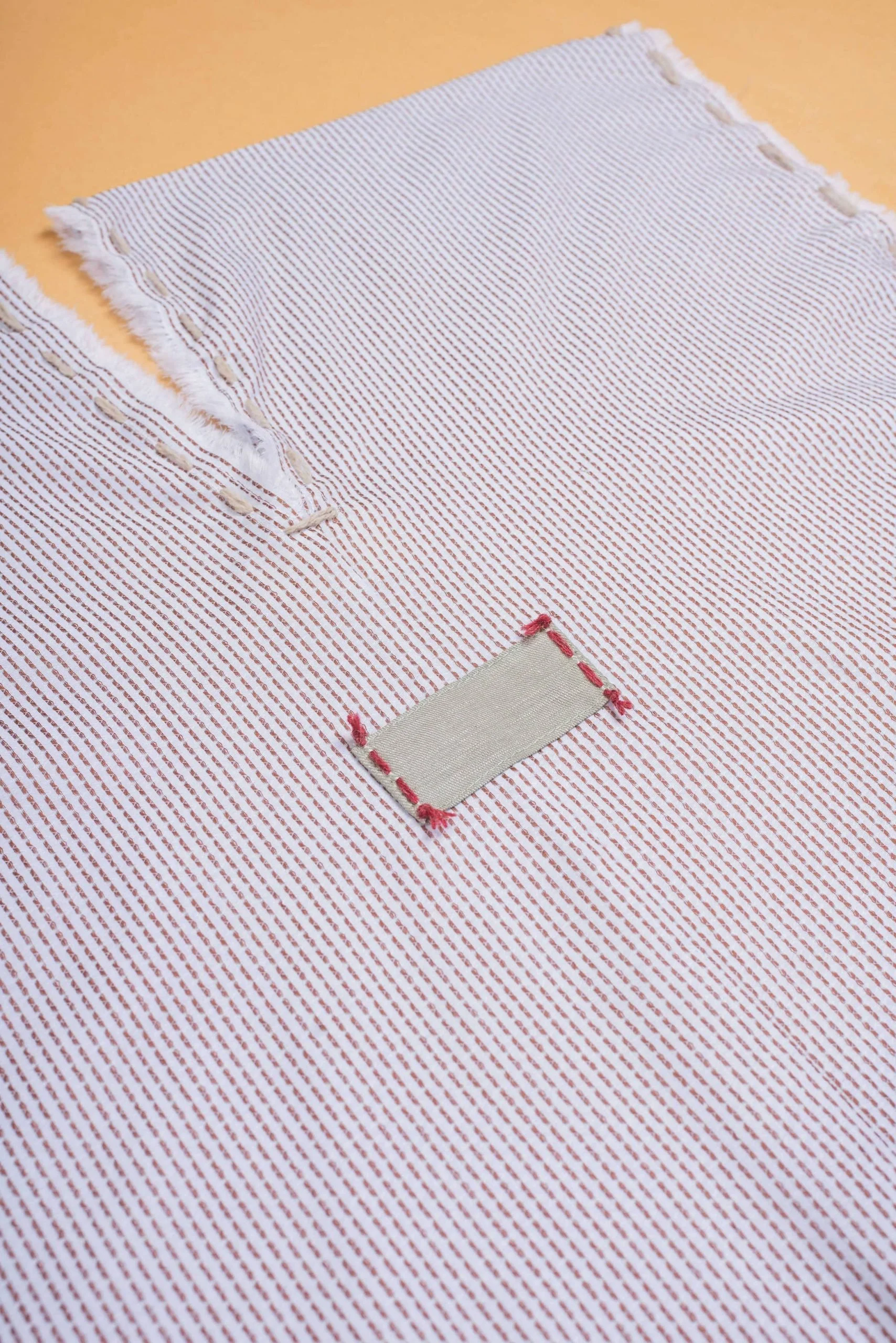AKSU
Unearthing cultural narratives of Indonesian tribes.
AKSU is a contemporary ready-to-wear brand based in Indonesia formed in 2016 by Nadira Suarga and Arintha Vysistha. It initially started as the co-founders’ final year project for their BA (Hons) in Fashion Management at Binus Northumbria School of Design. AKSU draws inspiration from the cultural practices of various indigenous tribes in the archipelago and adopted them in its narrative-driven collections.
‘Pateh’ (2022). Photo by Michelle S. Image courtesy of AKSU.
As classmates turned business partners, Nadira and Arintha bonded over their mutual interest in local art and culture. “Indonesian culture and its mysteries have been our main interest,” says Nadira. “We both love to explore more about them.” The brand’s name is a portmanteau of akar and suara, meaning roots and voice respectively in Indonesian. This reflects how AKSU’s garments serve as a medium to voice one’s Indonesian roots and identity. Nadira adds, “We believe that as Indonesian ourselves, we must be the ones responsible for helping our own people in preserving their culture.”
With AKSU, they convey stories through their garments. “Each of our collections tells a story of a tribe or cultural community in Indonesia,” explains Nadira. “Our goal is to form a deeper connection and understanding of their culture and way of life to raise the awareness of the local people and their craftsmanship.”
“Each of our collections tells a story of a tribe or cultural community in Indonesia. Our goal is to form a deeper connection and understanding of their culture and way of life to raise the awareness of the local people and their craftsmanship.”
‘Tampara’ (2016). Image courtesy of AKSU.
‘Mugejeg’ (2017). Image courtesy of AKSU.
AKSU made its debut at Jakarta Fashion Week 2017 with its couture collection ‘Tampara’, which was inspired by the culture of the Dayak people of Kalimantan. The following year, the brand launched ‘Mugejeg’, its first ready-to-wear collection that aimed to uplift the awareness of the Mentawai tribe from West Sumatra.
The label’s latest collection, ‘Pateh’ examines the culture of the Aga Tribe in Bali, who are the indigenous people of the island, and conveys the concept of balancing duality the tribe deeply embraces. It was launched in March 2022 with a showcase at The Westin Paris Hotel in Vendôme during Paris Fashion Week. The collection was presented along with other twelve Indonesian brands as a part of FD Paris Fashion Show Fall/Winter 2022 programme organised by Fashion Division, an international fashion event organiser and career centre.
Swatches of naturally-dyed fabric. Image courtesy of AKSU.
Each collection generally takes two to three months to complete. “It starts with research and development, design process, fabrication, sampling process, and gathering pieces to form the collection perfectly,” Nadira summarises. To start, the designers travel to the tribes’ settlements and conduct primary research through direct interactions with the local people. For ‘Mugejeg’ and ‘Pateh’, they made trips to Siberut Island in the Mentawai archipelago and the Bali Aga’s village at Tenganan Pegringsingan in Karangasem Regency respectively. Nadira adds, “Prior to our visits, we read about them through books and the internet, but there is nothing like the experience of being there and being able to observe and connect with the natives in person.”
During the trip to the Bali Aga Tribe’s village, their biggest challenge was the language barrier as the tribe speak in their own native Tenganan dialect. By using gestures and other body language, they were able to communicate with the locals and learn their ways of life. “The people of Bali Aga closely follow the traditional Balinese philosophy of ‘Rwa Bhineda’, a belief that all life depends on an absolute balance between opposite forces,” Nadira explains. “This means practising equality and respect between all living things, and finding harmony between duality: good and evil, joy and sorrow, spiritual and worldly.” They also learnt and observed the tribe’s ritual of Pandan War, where the tribesmen took part in combat using clubs made from pandan leaves to honour Indra, the Hindu god of war.
‘Pateh’ (2022). Photo by Michelle S. Images courtesy of AKSU.
‘Pateh’ (2022). Photo by Michelle S. Images courtesy of AKSU.
‘Pateh’ (2022). Photo by Michelle S. Images courtesy of AKSU.
AKSU communicates the stories they collect through design elements of silhouette, embellishments, colour palette, and finishing details. In ‘Pateh’, the Bali Aga Tribe’s perspective of balance and duality is reflected in the garments’ symmetrical silhouettes and minimalist cuts. Correspondingly, one of the pieces from the collection is a linen jumpsuit with pockets on each side of the leg featuring the pandan leaf, a reference to the Pandan War ritual.
Handwoven textile-making process for ‘Pateh’. Image courtesy of AKSU.
For the ‘Pateh’ collection, the brand worked with artisan communities to further highlight local craftsmanship. This includes Tarum, a Bali-based natural dyeing house, and weavers in the Tenganan village that crafts Geringsing textiles with a special technique called double-ikat. With this technique, both the warp and weft threads are dyed in complex patterns before weaving. The final design is achieved by combining the threads’ patterns into a preconceived ornamental form.
‘Bakkat’ dress from ‘Mugejeg’ (2017). Image courtesy of AKSU.
‘Uma’ top from ‘Mugejeg’ (2017). Image courtesy of AKSU.
The garments from the ‘Mugejeg’ collection convey the Mentawai Tribe's culture. Nadira and Arinta drew inspiration from observing the tribe’s daily activities such as fishing and hunting, and also the more spiritual practice of tattoo-making. A dress from the collection uses a crochet fabric similar to a fishing net, representing the Mentawai women's main line of work. Another top features hand-stitched line patterns that resemble a motif from their tribal tattoos known as titi. These intricate body tattoos are in the form of simple lines and shapes that symbolise objects of nature and personal achievements. The Mentawai people use titi to identify their tribe and distinguish the boundaries of their tribal religion.
‘Serupa’ (2023), in collaboration with Putu Surya. Image courtesy of AKSU.
‘SATUSAJA’ (2023), in collaboration with Futile Odds. Image courtesy of AKSU.
Footwear collaboration with Made To Wander for ‘Pateh’, 2022. Image courtesy of AKSU.
So far, the bi-annual collections have only been available through pre-order. Moving forward, the label continues to carry out its plans to expand outside of its seasonal presentations. In 2021, AKSU created a sub-line that specialises in creating custom-made bridal pieces using deadstock fabrics. In the past two years, it has also launched several collaborative efforts. This includes a footwear collection with Made To Wander presented as a part of ‘Pateh’ in 2022, and the following year, the brand released ‘Serupa’, an upcycled collection with Balinese visual artist Putu Surya and ‘SATUSAJA’, a capsule collection with visual artist Futile Odds. AKSU is currently focused on producing ready-to-wear capsule collections, as well as working on collaborations with other Indonesian creative practitioners. “In the future, we would love to collaborate with more local brands that are uniquely crafted and distinguishable,” Nadira comments.
In the long run, both co-founders hope for AKSU to be a platform to showcase Indonesian culture through more than just clothing. The first step in their plan starts with showing customers more of their research and design process through fashion films, showcases, and pop-up activations. “With what we hope to achieve, the work does not stop once the collection is out,” says Arintha. “It is a continuous effort to share and cover stories of the tribes we connect with.” With this objective in mind, AKSU continues to unearth narratives of native communities, encouraging their audiences to acquire a newfound appreciation for Indonesian culture and heritage.
“With what we hope to achieve, the work does not stop once the collection is out. It is a continuous effort to share and cover stories of the tribes we connect with.”












